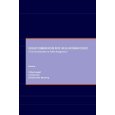Writing as an epistemic practice in knowledge-intensive settings
The need to understand how writing works as a knowledge-making practice becomes a pressing research concern in increasingly knowledge-intensive societies because it is largely through writing that knowledge is created, codified, shared, revised, contested, or used, while technologies enable or constrain writing as a knowledge-making practice in complex ways. This research area, therefore, addresses the role of writing and technologies in knowledge-intensive and consequently also writing-intensive settings. This work has focused on the role of writing as an epistemic practice across sectors of knowledge-intensive societies; on research writing and public engagement, especially in emerging digital environments; and on the state of doctoral writing in Canadian research-intensive universities.
Books
Starke-Meyerring, D., Paré, A., Artemeva, N., Horne, M., Yousoubova, L., (Eds.) (forthcoming). Writing in knowledge societies. West Lafayette, IN: Parlor Press and WAC Clearinghouse.
Beaudet, C., Grant-Russel, P., & Starke-Meyerring, D. (Eds.) (2008). Research communication in the social and human sciences: From dissemination to public engagement. Uxbridge, UK: Cambridge Scholars Press.
 |
This book brings together researchers from a variety of disciplines in the social and human sciences to address the need for research communication with the public. Citizens, policymakers, businesses, community organizations, workplace professionals, and other stakeholders depend on research in the social and human sciences to address our most pressing social problems, such as poverty, illiteracy, high dropout rates in schools, lack of social integration of minorities, and intolerance, to name but a few. Although research in the social and human sciences has grown rapidly, critics have argued that it has had little impact on the stakeholders who are to benefit from this research. This book addresses this problem by bringing together researchers who have identified the challenges in communicating across boundaries of researcher and practitioner communities and who have begun to develop solutions ranging from research dissemination in the media to stakeholder engagement in research networks and partnerships. |
Journal Articles, Chapters, and Papers
Starke-Meyerring, D. (forthcoming). The paradox of writing in doctoral education: Student experiences. In L. McAlpine & C. Amundson. (Eds.), Supporting the doctoral process: Research-based strategies. New York: Springer.
Paré, A., Starke-Meyerring, D., & McAlpine, L. (forthcoming). Knowledge and identity work in the supervision of doctoral student writing: Shaping rhetorical subjects. In D. Starke-Meyerring, et al. (Eds.). Writing in knowledge societies. West Lafayette, IN: Parlor Press and WAC Clearinghouse (http://wac.colostate.edu/).
Starke-Meyerring, D. (2010). Between peer review and peer production: Genre, wikis, and the politics of digital code in academe. In C. Bazerman, R. Krut, K. Lunsford, S. McLeod, S. Null, P. Rogers, & A. Stansell (Eds.), Traditions of writing research: Traditions, trends, and trajectories. (pp. 339-350). New York: Routledge.
Paré, A., Starke-Meyerring, D., & McAlpine, L. (2009). The dissertation as a multi-genre: Many readers, many readings. In C. Bazerman, D. Figueiredo, & A. Bonini, (Eds.), Genre in a changing world (pp. 179-193). West Lafayette, IN: Parlor Press and WAC Clearinghouse (http://wac.colostate.edu/).
McAlpine, L., Paré, A., & Starke-Meyerring, D. (2009). A shifting landscape for “English” Doctoral Education in the 21st Century? In D. Boud and A. Lee (Eds.), Changes to doctoral education. London, UK: Routledge.
Starke-Meyerring, D. (2008). Genre, knowledge, and digital code in web-based communities: An integrated theoretical framework for shaping digital discursive spaces. International Journal of Web-Based Communities 4(4), 398-417.
Emerging digital discursive spaces, such as wikis, offer new opportunities for knowledge communication. However, participants join such spaces through the lenses of their established discursive practices. These practices, however, interact with the code—the technological design—of these spaces, which can reproduce, question, or undermine them, and present alternative opportunities and visions for knowledge communication. Participants, therefore, ultimately face questions about the ways in which tensions between established (genred) practices and alternative practices enabled by code are to be negotiated. Drawing on theories of rhetoric and technology, this paper offers an integrated theoretical framework that allows developers of online communities to examine the established rhetorical practices of participants and the ways in which the code of the discursive space may question or facilitate these practices. The paper then illustrates how this framework may be applied to facilitating academic knowledge communication in a wiki space and concludes with implications for decision making in shaping digital discursive spaces for knowledge communication.
Starke-Meyerring, D., & Paré, A. (forthcoming). Re-inventing the rhetorical tradition, again: Writing (in) the knowledge society. In D. Starke-Meyerring, et al. (Eds.). Writing (in) the knowledge society.
